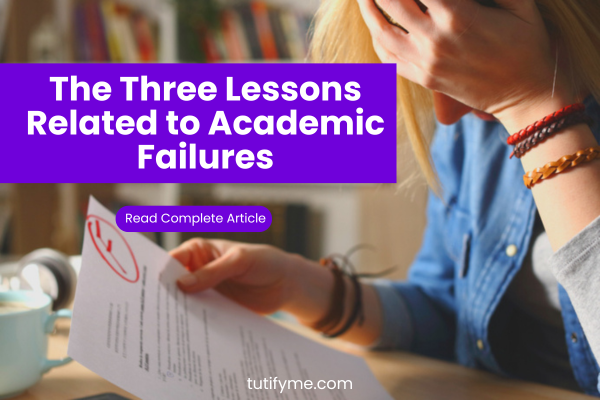Do you know what ‘failure’ really is? A blessing in disguise! Don’t let anyone tell you otherwise! We have all seen students in our schools, colleges and universities who were high-achievers and then went down the plane.
There are multiple theories that state people who were under confident with regards to academic failure couldn’t perform well in professional lives as well. Because throughout their academic years where their mindsets should’ve been chiseled to deal with academic failures, they were afraid of taking the risks.
Sometimes students fail at any assignment, quiz or a mids exam and they suddenly go down in depths of self-doubt. Repeatedly failing at something makes them feel bad about themselves and guess what happens, they stop trying!
Before you learn the top three lessons hidden in academic failure for which you have to read till the end;
Among many others, the two most common reasons for students not taking academic failure as an opportunity are:
a. When a student is a good scorer since their academics’ beginning, it puts them in constant pressure to perform the same or else they think they lost it! Haven’t we all seen those two-three students who cried when they got 99/100 because why not that 1 mark?
b. It also happens when you introduce your child to the tags of ‘comparison’, then their achievements become yours not theirs. Because they start performing better not for learning but because of the fear of any disappointment which may come from you as a parent.

These things destroy your child! However, for a true learner, nothing named as a “victim mindset” exists.
Martin Seligman, a psychologist has put this in a better way in his Theory of Learned Helplessness which describes a state where;
“An individual learns to accept and endure negative situations, believing they have no control over their circumstances, even when they could potentially change them; essentially, they “learn” to be helpless in the face of adversity.”
The more you get up in your academic journey, the more you understand there’s no place for crybabies at your campus. You have to get up anyway and no one is going to wait longer for you because they have their own struggles and of course assignment deadlines to look for.
Having said that, if a student ever comes across an academic failure, it is important for him to know what it has come to teach him. Here’s what academic failures teach us:
1. Anything that you get right at first attempt will be forgotten but the things that take your time and sweat will always be remembered.
I got weekly projects based on microcontrollers in a semester and I still remember those two weeks where our projects worked right away, I didn’t learn much because obviously everything worked well.
And then there was a project related to “Automated Door”. It took me two weeks (to the rest of the students, it took one), but I got to learn so much even about the basic concepts of coding and mechanical malfunctions etc. A story to a wise! (improvised)
2. Life has to make you try the taste of humility sometimes so that you don’t go mad with pride.
Especially as someone who’s new to something, there’s a high chance we often get overconfident. That is where the chances of error and academic failures are the highest. Therefore, it has to make you humble in order for you to stay in balance and conscious about putting the same effort each time.
I worked with a group of males one time for a project, everything was working and when we went to demonstrate it to our teacher, it didn’t work. There was no code or wiring error and yes it worked (we got 9/10) but after an hour of trying to understand what happened.
And I will always remember my groupmate telling us there, “Sometimes it has to happen to make us humble.”

3. Academic failures are more about testing our ability to “NOT GIVE UP” than us cramming lecture notes.
Sitting for a written exam or a laboratory exam or standing in front of your class for a presentation or in front of hundreds of students as a host will teach you the most about yourself. They are important, these situations are important.
a. Going out of your comfort zone is important.
b. Panicking on stage even after practicing your speech is important.
c. Failing at a task you thought you knew is important.
d. Losing yourself is important.
Facing your fear of academic failure is important! All it does is teach you about yourself and there’s nothing better and bigger than knowing yourself.
We hope this helps you. What happens at most if you fail? People will mock you? You’ll be alone? You’ll feel disgraced for a while? But the next day, life will be the same. It does not stop when you fail at a subject. Get this tagged in your mind and you’ll see what wonders this mindset will do to you.

